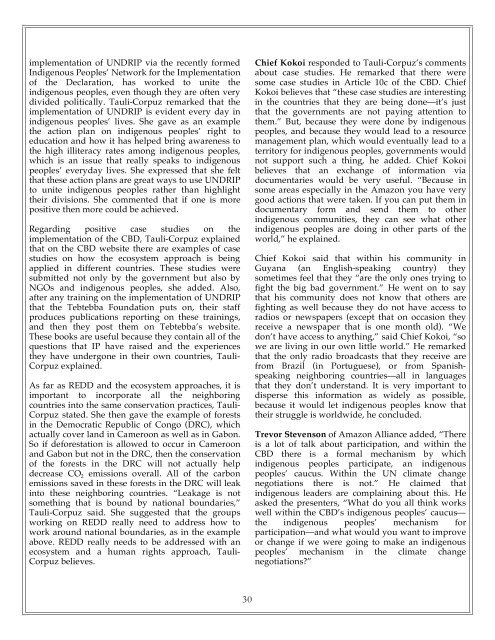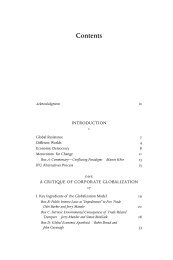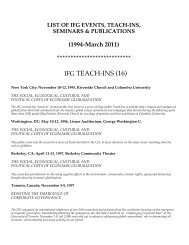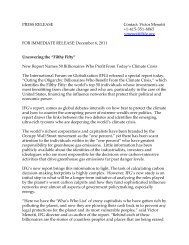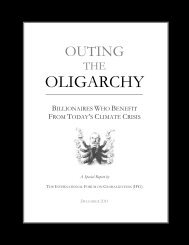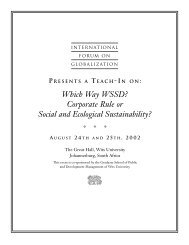UNDRIP Report - English FINAL - International Forum on Globalization
UNDRIP Report - English FINAL - International Forum on Globalization
UNDRIP Report - English FINAL - International Forum on Globalization
You also want an ePaper? Increase the reach of your titles
YUMPU automatically turns print PDFs into web optimized ePapers that Google loves.
implementati<strong>on</strong> of <str<strong>on</strong>g>UNDRIP</str<strong>on</strong>g> via the recently formed<br />
Indigenous Peoples’ Network for the Implementati<strong>on</strong><br />
of the Declarati<strong>on</strong>, has worked to unite the<br />
indigenous peoples, even though they are often very<br />
divided politically. Tauli-Corpuz remarked that the<br />
implementati<strong>on</strong> of <str<strong>on</strong>g>UNDRIP</str<strong>on</strong>g> is evident every day in<br />
indigenous peoples’ lives. She gave as an example<br />
the acti<strong>on</strong> plan <strong>on</strong> indigenous peoples’ right to<br />
educati<strong>on</strong> and how it has helped bring awareness to<br />
the high illiteracy rates am<strong>on</strong>g indigenous peoples,<br />
which is an issue that really speaks to indigenous<br />
peoples’ everyday lives. She expressed that she felt<br />
that these acti<strong>on</strong> plans are great ways to use <str<strong>on</strong>g>UNDRIP</str<strong>on</strong>g><br />
to unite indigenous peoples rather than highlight<br />
their divisi<strong>on</strong>s. She commented that if <strong>on</strong>e is more<br />
positive then more could be achieved.<br />
Regarding positive case studies <strong>on</strong> the<br />
implementati<strong>on</strong> of the CBD, Tauli-Corpuz explained<br />
that <strong>on</strong> the CBD website there are examples of case<br />
studies <strong>on</strong> how the ecosystem approach is being<br />
applied in different countries. These studies were<br />
submitted not <strong>on</strong>ly by the government but also by<br />
NGOs and indigenous peoples, she added. Also,<br />
after any training <strong>on</strong> the implementati<strong>on</strong> of <str<strong>on</strong>g>UNDRIP</str<strong>on</strong>g><br />
that the Tebtebba Foundati<strong>on</strong> puts <strong>on</strong>, their staff<br />
produces publicati<strong>on</strong>s reporting <strong>on</strong> these trainings,<br />
and then they post them <strong>on</strong> Tebtebba’s website.<br />
These books are useful because they c<strong>on</strong>tain all of the<br />
questi<strong>on</strong>s that IP have raised and the experiences<br />
they have underg<strong>on</strong>e in their own countries, Tauli-<br />
Corpuz explained.<br />
As far as REDD and the ecosystem approaches, it is<br />
important to incorporate all the neighboring<br />
countries into the same c<strong>on</strong>servati<strong>on</strong> practices, Tauli-<br />
Corpuz stated. She then gave the example of forests<br />
in the Democratic Republic of C<strong>on</strong>go (DRC), which<br />
actually cover land in Camero<strong>on</strong> as well as in Gab<strong>on</strong>.<br />
So if deforestati<strong>on</strong> is allowed to occur in Camero<strong>on</strong><br />
and Gab<strong>on</strong> but not in the DRC, then the c<strong>on</strong>servati<strong>on</strong><br />
of the forests in the DRC will not actually help<br />
decrease CO 2 emissi<strong>on</strong>s overall. All of the carb<strong>on</strong><br />
emissi<strong>on</strong>s saved in these forests in the DRC will leak<br />
into these neighboring countries. “Leakage is not<br />
something that is bound by nati<strong>on</strong>al boundaries,”<br />
Tauli-Corpuz said. She suggested that the groups<br />
working <strong>on</strong> REDD really need to address how to<br />
work around nati<strong>on</strong>al boundaries, as in the example<br />
above. REDD really needs to be addressed with an<br />
ecosystem and a human rights approach, Tauli-<br />
Corpuz believes.<br />
Chief Kokoi resp<strong>on</strong>ded to Tauli-Corpuz’s comments<br />
about case studies. He remarked that there were<br />
some case studies in Article 10c of the CBD. Chief<br />
Kokoi believes that “these case studies are interesting<br />
in the countries that they are being d<strong>on</strong>e—it’s just<br />
that the governments are not paying attenti<strong>on</strong> to<br />
them.” But, because they were d<strong>on</strong>e by indigenous<br />
peoples, and because they would lead to a resource<br />
management plan, which would eventually lead to a<br />
territory for indigenous peoples, governments would<br />
not support such a thing, he added. Chief Kokoi<br />
believes that an exchange of informati<strong>on</strong> via<br />
documentaries would be very useful. “Because in<br />
some areas especially in the Amaz<strong>on</strong> you have very<br />
good acti<strong>on</strong>s that were taken. If you can put them in<br />
documentary form and send them to other<br />
indigenous communities, they can see what other<br />
indigenous peoples are doing in other parts of the<br />
world,” he explained.<br />
Chief Kokoi said that within his community in<br />
Guyana (an <str<strong>on</strong>g>English</str<strong>on</strong>g>-speaking country) they<br />
sometimes feel that they “are the <strong>on</strong>ly <strong>on</strong>es trying to<br />
fight the big bad government.” He went <strong>on</strong> to say<br />
that his community does not know that others are<br />
fighting as well because they do not have access to<br />
radios or newspapers (except that <strong>on</strong> occasi<strong>on</strong> they<br />
receive a newspaper that is <strong>on</strong>e m<strong>on</strong>th old). “We<br />
d<strong>on</strong>’t have access to anything,” said Chief Kokoi, “so<br />
we are living in our own little world.” He remarked<br />
that the <strong>on</strong>ly radio broadcasts that they receive are<br />
from Brazil (in Portuguese), or from Spanishspeaking<br />
neighboring countries—all in languages<br />
that they d<strong>on</strong>’t understand. It is very important to<br />
disperse this informati<strong>on</strong> as widely as possible,<br />
because it would let indigenous peoples know that<br />
their struggle is worldwide, he c<strong>on</strong>cluded.<br />
Trevor Stevens<strong>on</strong> of Amaz<strong>on</strong> Alliance added, “There<br />
is a lot of talk about participati<strong>on</strong>, and within the<br />
CBD there is a formal mechanism by which<br />
indigenous peoples participate, an indigenous<br />
peoples’ caucus. Within the UN climate change<br />
negotiati<strong>on</strong>s there is not.” He claimed that<br />
indigenous leaders are complaining about this. He<br />
asked the presenters, “What do you all think works<br />
well within the CBD’s indigenous peoples’ caucus—<br />
the indigenous peoples’ mechanism for<br />
participati<strong>on</strong>—and what would you want to improve<br />
or change if we were going to make an indigenous<br />
peoples’ mechanism in the climate change<br />
negotiati<strong>on</strong>s?”<br />
30


